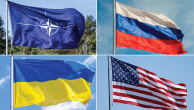
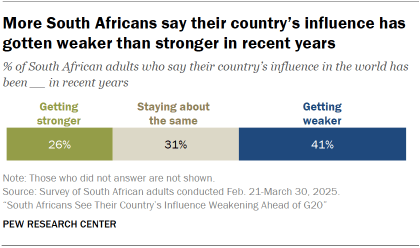
South Africa will soon host the annual G20 summit – the first on the African continent – marking the end of the country’s one-year term as president of the forum. In a survey conducted this spring, 41% of South Africans say their country’s influence on the world stage has been getting weaker in recent years.
Around a quarter of South Africans (26%) say their country’s influence has been getting stronger. Another 31% see its role as being about the same as it’s been in recent years.
For more on South Africans’ views of their country’s influence, jump to Chapter 1.
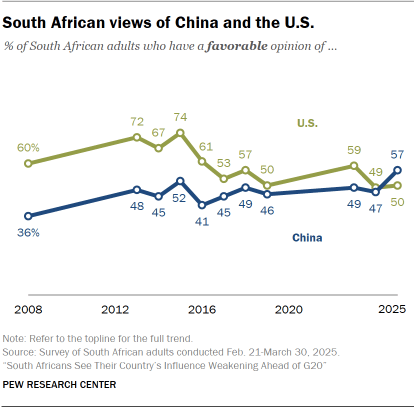
In the same survey, we asked South Africans their views of the United States and China. A 57% majority have favorable opinions of China while 50% say the same of the U.S. This marks the first time ratings of China are higher than ratings of the U.S. since we began tracking South Africans’ opinion of these countries in 2008.
Fieldwork timing
This survey of South Africans was fielded in the early months of U.S. President Donald Trump’s second term, after he cut funding for South Africa and Secretary of State Marco Rubio skipped the annual meeting of G20 foreign ministers. The survey preceded the arrival of White Afrikaner refugees to the U.S. and Trump’s confrontation with South African President Cyril Ramaphosa in the White House.
Since last year, the share of South African adults who have favorable views of China has increased 10 percentage points, while the share who see the U.S. favorably has held steady at one of the lowest shares measured since we first asked this question in 2002.
This increase in positive ratings of China is also evident on other questions we regularly field. When asked which is the world’s leading economic power – the U.S., China, the EU or Japan – South Africans increasingly recognize China as such (42 % vs. 33% in 2023).
And more South Africans say that it is more important to have strong economic ties with China (50%) than say the same about the U.S. (33%). The gap was smaller in 2019, when 42% preferred closer ties with the U.S., while 39% said the same about China.
How do South Africans’ views of other countries and organizations compare?
Our Spring 2025 Global Attitudes Survey asked South Africans – as well as adults in 24 other countries – about their attitudes toward other nations and international organizations as well. Here’s what we found:
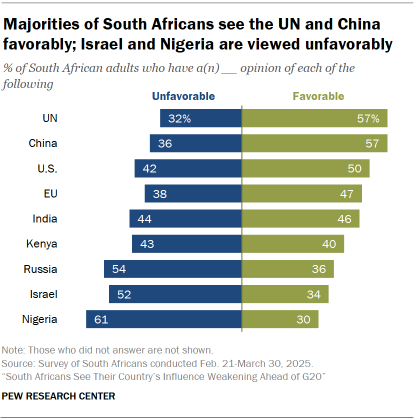
- UN: A majority of South Africans (57%) have a favorable opinion of the UN, which generally receives positive marks across the 25 countries we surveyed in spring 2025.
- China: South Africans rate China more positively than people in many other countries surveyed this spring.
- U.S.: In South Africa, opinion of the U.S. did not shift significantly between 2024, the last year of Joe Biden’s presidency, and 2025, the first year of President Donald Trump’s second term. This makes South Africa unique among many of the 23 other countries surveyed.
- EU: The EU is seen positively by most countries surveyed. South African adults rate the EU relatively low, but their views still lean positive (47% favorable vs. 38% unfavorable).
- India: South Africans have mixed views of India, with 46% saying they have a favorable opinion of the country and 44% saying they have an unfavorable view. International opinion of India is somewhat more positive than negative.
- Russia: South African opinion of Russia is mostly negative. A 54% majority have an unfavorable view, compared with 36% who see Russia favorably. This contributes to a broader pattern of negative ratings across the 25 countries surveyed.
- Israel: About one-third of South Africans (34%) have a positive opinion of Israel, which receives mostly negative ratings across 24 countries surveyed.
Views between Kenya, Nigeria and South Africa
To better understand views between African nations, we asked Kenyans, Nigerians and South Africans their opinions of each other:
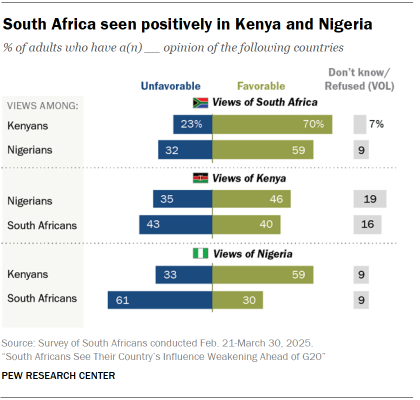
- Majorities of adults in Kenya (70%) and Nigeria (59%) have favorable views of South Africa. When the question was last asked of Kenyans in 2007, about nine-in-ten had a positive view of South Africa.
- Nigerians’ opinions of Kenya are more positive than negative, while South Africans’ views are mixed.
- Kenyans’ opinions of Nigeria are mostly positive, while South Africans’ views are mostly negative.
South Africans’ ratings of political leaders and parties
Our survey this spring also asked South Africans to rate major parties and political leaders in their country, including President Cyril Ramaphosa and his party, the African National Congress (ANC). The survey was fielded months after the 2024 election in which – for the first time in more than 30 years – the ANC did not win a majority of seats. But the survey showed support for both the party and its leader (63% each).
For more on South Africans’ opinions of national political parties and leaders, as well as their ratings of the economy and democracy, jump to Chapter 2.



